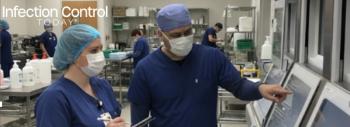
ANSI/AAMI PB70:2022 Updates Explained
ANSI/AAMI Protective Barriers 70 (PB70) has been updated. A presentation at the annual HSPA conferences explained the changes, and ICT spoke to the presenters. Listen to the interview!
The Association for the Advancement of Medical Instrumentation (AAMI) and American National Standards Institute (ANSI) has released a revised
Presenters at the 2023 HSPA Annual Conference held in Nashville, Tennessee, from May 6-10, explained the changes. The presenters, Jill Holdsworth, CIC, FAPIC, NREMT, CRCST, infection prevention manager at Emory University Hospital Midtown; and Cheron Rojo, BS, FCs, CHL, CIS, CER, CFER, CRCST, clinical education coordinator for sterile processing departments, Healthmark, spoke with Infection Control Today® about some of the key updates.
PB70, Rojo explained, "[has been] historically a manufacturer's document for any type of protective barrier. And that would include drapes, gowns, and different types of gowns, from isolation to surgical gowns and such. The document went over what is recommended by the manufacturer when they're building a protective barrier, which would be like the testing, what differences, and what would be required for each type of level, like the testing [that] is required for each level. [The document] also goes over the level of protection as well. But now, with a new revision, it's…switching gears a little bit [to be] more of a user document, and hand in hand with manufacturing users.
In her portion of her presentation, Holdsworth explained more about the changes in the revision. “[I talked about] some key updates in the revision that just came out a couple of months ago. We hadn’t had a revision since 2012. It's really important [for sterile processing technicians] to get this document to go over what's included.”
Holdsworth continued, “But I'm going to go over a couple of the key updates. One of the most important ones is that we've included a category just for decontamination gowns. And the reason this is important is that we've heard a lot of complaints and concerns from those who work in sterile processing. Because they're telling us they don't have the [personal protective equipment] they feel like they need that keeps them safe. This new standard includes decontamination gowns; as a specific category, it requires, at minimum, any level 3 protection for the gowns that are required for those working in decontamination. So, you will start seeing over the next year manufacturers coming out with gowns that are specifically labeled for decontamination, which is also part of the new standards as well. For labeling, you have to very clearly label what type of gown you're picking up and using and wearing. So, the reason that's important, too, is because we made sure that different types of gowns were included. You can't just pick up a gown and wonder, is this back protective? If it is this open back? Or is it a back that has coverage, but you're not sure if it protects you? This is now a requirement to include if it is an open-back, nonprotective back gown. Is it full coverage [at] a new level 3, 4? All of that is now required to be included in the label so that it's safer for the end users, and they know exactly what they're using and make more informed decisions about their safety.”
Another key update is a new type of gown called the surgical gown-E for extended coverage. “This is for something like orthopedic surgery or something that you can anticipate having much more splashing or what embodies fluid exposure,” Holdsworth says. “So that may or may not get into sterile processing space but fits into the surgical services space. The critical zones are a little more than a little more coverage. It gives another option for our team members to be more protected when their risk assessment deems that that's necessary.”
Newsletter
Stay prepared and protected with Infection Control Today's newsletter, delivering essential updates, best practices, and expert insights for infection preventionists.




